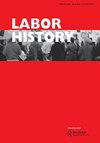“为了和平与保卫苏联”:1935-1939年人民阵线时代英国共产主义的领导
IF 0.7
4区 管理学
Q1 HISTORY
引用次数: 0
摘要
摘要本次对民阵时期英国共产党中央委员会的亲社会调查,分析了这些年在中央委员会任职的47名共产党人的出身、职业、政治生涯和目的地。从第三时期的左派到阶级合作的转变,在共产党领导层的特征中发现了最小的反映,这与前一代的特征保持一致。人民阵线的年龄稍大,女性比例下降,受过高等教育的人数对中产阶级的关注只略有增加。苏格兰人更多,英国人更少,而人员流动率仍然很高与“延续小组”相比,初出茅庐的人更年轻,也相对原始——40%的新人在第三时期加入了CPGB。然而,CC服务可以追溯到20世纪20年代初的“核心”和持续到20世纪50年代的“核心中的核心”确保了连续性。保持了前几年观察到的CC成员与党的官僚机构的融合:75%的CC代表担任全职职位。以前的文章提供了“延续小组”的生活史;这里的传记重点是“出道者”。但委员会的大多数成员都是“务实”的工人阶级活动家。作为政策的执行者,他们最终把理论和战略留给了共产国际和苏联精英。本文章由计算机程序翻译,如有差异,请以英文原文为准。
‘For peace and defence of the Soviet Union’: the leadership of British Communism in the Popular Front era, 1935–1939
ABSTRACT This prosopographical investigation of the Central Committee (CC) of the British Communist Party during the Popular Front era analyses the origins, occupations, political careers and destinations of the 47 Communists who served on the CC in these years. The transition from Third Period leftism to class collaboration found minimal reflection in the characteristics of the Communist leadership, which remained in line with those of the preceding cohort. The Popular Front group was slightly older, the percentage of women declined and attention to the middle class saw only marginal increase in the numbers that experienced higher education. There were more Scots, fewer English while turnover remained high. ‘Debutantes’ were younger and relatively raw compared with the ‘Continuation Group’ − 40% of newcomers had joined the CPGB during the Third Period. However, a ‘core’ whose CC service stretched back to the early 1920s and a ‘core of the core’ who endured into the 1950s ensured continuity. The integration of CC members into the party bureaucracy observed in earlier years was maintained: 75% of CC representatives occupied full-time posts. Previous articles provided life histories of the ‘Continuation Group’; the biographical focus here is on the ‘Debutantes’. But the majority of committee members were ‘practical’ working-class activists. Executors of policy, in the end they left theory and strategy to the Comintern and the Soviet elite.
求助全文
通过发布文献求助,成功后即可免费获取论文全文。
去求助
来源期刊

Labor History
Multiple-
CiteScore
1.00
自引率
28.60%
发文量
44
期刊介绍:
Labor History is the pre-eminent journal for historical scholarship on labor. It is thoroughly ecumenical in its approach and showcases the work of labor historians, industrial relations scholars, labor economists, political scientists, sociologists, social movement theorists, business scholars and all others who write about labor issues. Labor History is also committed to geographical and chronological breadth. It publishes work on labor in the US and all other areas of the world. It is concerned with questions of labor in every time period, from the eighteenth century to contemporary events. Labor History provides a forum for all labor scholars, thus helping to bind together a large but fragmented area of study. By embracing all disciplines, time frames and locales, Labor History is the flagship journal of the entire field. All research articles published in the journal have undergone rigorous peer review, based on initial editor screening and refereeing by at least two anonymous referees.
 求助内容:
求助内容: 应助结果提醒方式:
应助结果提醒方式:


